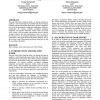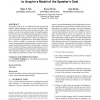100
click to vote
OTM
2005
Springer
15 years 7 months ago
2005
Springer
Expressive knowledge representations with flexible semantic similarity measures are central for the functioning of semantic information retrieval, information integration, matchmak...
99
Voted
CIKM
2005
Springer
15 years 7 months ago
2005
Springer
The goal of this Robot Ontology effort is to develop and begin to populate a neutral knowledge representation (the data structures) capturing relevant information about robots and...
123
click to vote
KCAP
2005
ACM
15 years 7 months ago
2005
ACM
This paper describes a new environment, COE, for capturing and formally representing expert knowledge for use in the Semantic Web. COE exploits the ease of use and rapid knowledge...
133
click to vote
KCAP
2005
ACM
15 years 7 months ago
2005
ACM
An ultimate goal of AI is to build end-to-end systems that interpret natural language, reason over the resulting logical forms, and perform actions based on that reasoning. This r...
112
click to vote
KCAP
2005
ACM
15 years 7 months ago
2005
ACM
For decades, researchers in knowledge representation (KR) have argued for and against various choices in KR formalisms, such as Rules, Frames, Semantic nets, and Formal logic. In ...
117
Voted
IEEEICCI
2006
IEEE
15 years 8 months ago
2006
IEEE
Knowledge representation is essential for semantics modeling and intelligent information processing. For decades researchers have proposed many knowledge representation techniques...
118
Voted
ICALT
2006
IEEE
15 years 8 months ago
2006
IEEE
In this paper we deal with knowledge representation in the area of learning design and adaptive learning. Specification of concrete instances is usually context-dependent and does...
88
Voted
KI
2007
Springer
15 years 8 months ago
2007
Springer
The W3C standard OWL provides a decidable language for representing ontologies. While its use is rapidly spreading, efforts are being made by researchers worldwide to augment OWL ...
115
Voted
KI
2007
Springer
15 years 8 months ago
2007
Springer
The relationship and possible interplay between different knowledge representation and reasoning paradigms is a fundamental topic in artificial intelligence. For expressive knowl...
105
Voted
ICLP
2007
Springer
15 years 8 months ago
2007
Springer
This note provides background information and references to the tutorial on recent research developments in logic programming inspired by need of knowledge representation.


